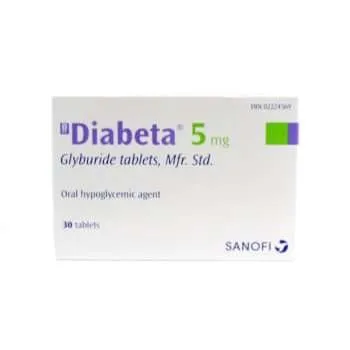Diabeta (Glyburide) Tablets
$19.99
Glyburide (Generic)
Glyburide
Reasons to buy

Diabeta (Glyburide) Tablets
HOW DOES DIABETA WORK?
Diabeta belongs to the class of drugs called sulfonylureas. It decreases blood glucose levels by causing insulin release from the pancreas. This mechanism requires functioning beta cells in the pancreatic islets. Diabeta’s mechanism for lowering blood glucose levels has not been clearly defined.
SIDE EFFECTS
Common side effects associated with Diabeta include:
- Nausea
- Feeling full
- Heartburn
- Muscle or joint pain
- Blurred vision
- Skin rash and/or itching
- Weight gain
Serious side effects include:
- Abdominal pain
- Fever
- Loss of appetite
- Clay-colored stools
- Dark urine
- Jaundice or pale skin
- Confusion
- Weakness
- Seizures
- Trouble breathing
WARNINGS AND PRECAUTIONS
Cardiovascular Death
Taking oral hypoglycemic agents has shown to increase risk of cardiovascular death compared to dietary changes alone or dietary changes in addition to insulin.
Macrovascular Effects
There are no studies that have evaluated the macrovascular risk with Diabeta use.
Hypoglycemia
The sulfonylurea class of medications has been shown to cause severe hypoglycemia. It is important to consider the patient, dose, and instructions to prevent hypoglycemia. If a patient has renal or hepatic impairment, they may have increased concentrations of Diabeta in the blood. Additionally, pituitary and adrenal insufficiency can also increase one’s risk of developing hypoglycemia with glycemic control agents. Hypoglycemia symptoms may be masked in those with autonomic neuropathy, geriatrics, and those taking beta blockers. Individuals are at a greater risk of hypoglycemia when they are in a calorie deficit, undergo strenuous exercise, drink alcohol, or take more than one drug affecting glucose.
If a patient’s blood glucose is well-controlled but they experience external stress such as surgery, infection, trauma, or fever, their glucose levels may become uncontrolled. In these circumstances, Diabeta should be discontinued, and insulin should be administered.
Hypoglycemic agents, like Diabeta, may decrease in effectiveness after prolonged treatment. This may be due to disease progression or lessened response to the medication. This circumstance is known as secondary failure. It is different than primary failure, which refers to drug failure upon initial trial of the medication.
Hemolytic Anemia
Individuals who have glucose 6-phosphate dehydrogenase (G6PD) deficiency may experience hemolytic anemia when treated with sulfonylureas. Diabeta, a sulfonylurea, is an example of a drug that may cause this. Therefore, Diabeta should be used with caution in those with G6PD deficiency. G6PD deficient patients should try a drug not in the sulfonylurea class. Hemolytic anemia has also been observed in individuals without known G6PD deficiency.
Hypoglycemia with Concomitant Use of Certain Drugs
Other drugs may potentiate the hypoglycemic effects of sulfonylureas such as Diabeta. These drugs include nonsteroidal anti-inflammatory agents (NSAIDs), disopyramide, ACE inhibitors, fluoxetine, salicylates, clarithromycin, sulfonamides, chloramphenicol, monoamine oxidase inhibitors (MAOIs), probenecid, and beta-adrenergic blocking agents. If patients are taking Diabeta and one or more of these agents, patients should be monitored for signs and symptoms of hypoglycemia. If one of these drugs is discontinued, the patient should be monitored for uncontrolled glucose levels.
DRUG INTERACTIONS
Bosentan
Coadministration of glyburide with bosentan has caused elevations in liver enzymes. Therefore, Diabeta and bosentan should not be administered together.
Miconazole
Oral miconazole and oral antidiabetic agents have been reported to cause severe hypoglycemia. It is not known if this phenomenon can also occur with other miconazole routes of administration, such as intravenous, topical, or vaginal.
Fluoroquinolone Antibiotics
Glyburide may interact with fluoroquinolone antibiotics causing increased hypoglycemic action of glyburide. The mechanism underlying this phenomenon is not well understood.
Coumarin Derivatives
Glyburide may interact with coumarin causing lessened effects of the coumarin derivatives. The mechanism underlying this phenomenon is not well understood.
CY2C9 and CYP3A4 Inducers and Inhibitors
CY2C9 and CYP3A4 inducers, such as rifampin, may cause a loss of glucose control when used with Diabeta. Additionally, co-administration of Diabeta with CYP2C9 and CYP3A4 inhibitors can also cause an interaction.
Colesevelam
Concomitant use of colesevelam and Diabeta caused decreases in glyburide concentrations. Glyburide should be taken at least four hours before colesevelam.
Cyclosporine
Diabeta can cause elevations in cyclosporine concentrations leading to toxicity. Patients should be monitored and doses potentially adjusted if both drugs are to be taken by the patient.
Hyperglycemic Drugs
Medications that can cause hyperglycemia may lead to uncontrolled glucose levels when taken with Diabeta. If these agents are taken with Diabeta, patient blood glucose levels should be monitored. If these medications are discontinued while on Diabeta, the patient should be monitored for signs and symptoms of hypoglycemia. These drugs include diuretics, phenothiazines, corticosteroids, thyroid medications, estrogens, phenytoin, oral contraceptives, nicotinic acid, calcium channel blocking drugs, isoniazid, and sympathomimetics.
SPECIFIC POPULATIONS
Pregnancy
There are no well-controlled studies evaluating Diabeta during pregnancy. The risks and benefits of using Diabeta during pregnancy should be weighed before administering. However, uncontrolled glucose levels during pregnancy pose an increased risk of congenital abnormalities. Therefore, diabetic patients who are pregnant should be controlled on insulin to stabilize glucose levels.
Lactation
It is not known if Diabeta is excreted into human milk. However, certain sulfonylureas have been shown to be excreted into human milk. Nursing infants are at risk for hypoglycemia, and therefore the benefits and risks of treatment should be weighed. If Diabeta is stopped and diet alone cannot control glucose levels, providers should consider initiating insulin therapy.
Pediatrics
Diabeta has not been studied in pediatrics. Thus, efficacy and safety has not been established in younger patients.
Geriatrics
In clinical trials, there was no difference in safety or effectiveness between younger patients and patients older than 65 years of age. However, increased sensitivity in geriatric patients cannot be discounted. Geriatric patients also have an increased incidence of renal insufficiency, and therefore renal function should be monitored during therapy.
| Quantity | 2.5mg – 100 tabs |
|---|
